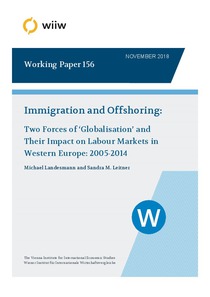Immigration and offshoring
This paper investigates with a joint approach the impact of immigration and different measures of ‘offshoring’ on the labour demand and demand elasticities of native workers in four different occupational groups: managers/professionals, clerks, craft workers and manual workers. It shows that of all...
| Main Authors: | , |
|---|---|
| Institution: | ETUI-European Trade Union Institute |
| Format: | TEXT |
| Language: | English |
| Published: |
Vienna
2018
WIIW |
| Subjects: | |
| Online Access: | https://www.labourline.org/KENTIKA-19304440124911226229-immigration-and-offshoring.htm |
| Summary: | This paper investigates with a joint approach the impact of immigration and different measures of ‘offshoring’ on the labour demand and demand elasticities of native workers in four different occupational groups: managers/professionals, clerks, craft workers and manual workers. It shows that of all measures of globalisation considered immigration has the most consistent and strongest negative effect on the employment of native workers, particularly on managers/professionals, clerks and manual workers. The employment effects of offshoring differ by the measure used and are positive for craft workers but, in contrast to what is typically found in the literature, negative for the high-skilled group of managers/professionals. Furthermore, immigration and offshoring both impact on natives’ labour demand elasticities but the effect differs by occupational group. Thus, while the immigration of craft workers reduces labour demand elasticities for native craft workers, the immigration of managers/professionals and clerks has the opposite effect on native workers in the same occupations. Furthermore, we test for cross effects of migration and outsourcing between the different occupational groups." |
|---|---|
| Physical Description: | 39 p. Digital |

